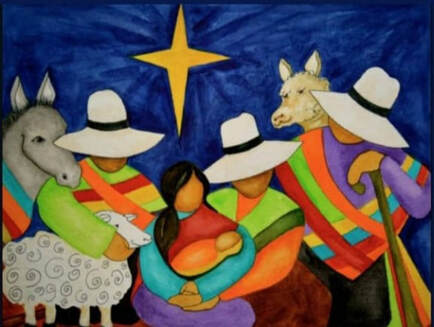 "Peruvian Nativity- God With Us" Marcia Carole "Peruvian Nativity- God With Us" Marcia Carole Joy to the World! Be silent for a moment and consider: What is the good news? What is good news to displaced people? To an asylum-seeker? To someone in a refugee camp? To someone awaiting resettlement? To someone longing for truth and reconciliation? What is good news to you? Here is the really good news: We are neither hopeless nor helpless as we face the refugee situation in the world, nor any of the trials and troubles that assail us. Christ has come, and he is still present in our midst! And whether we do big things or small things, if we do them faithfully and with the love of Christ, they have eternal significance. Jesus is with us. Here is a brief story of one house in Canada that is continuing to bring the joy of God into the world: The Peoples House opened its doors to refugees in January 2016. The majority of residents are refugee claimants. These asylum seekers receive care and support at the house during their first few months in Canada. This home is a ministry of The Peoples Church in Toronto, and was created with the support of IAFR Canada, in response to the question of how the church could best respond to the refugee crisis that is facing our country and our world. Thousands of refugees are fleeing their homes due to danger and persecution. They come from all around the world and seek a safe home and a new beginning in Canada. The Peoples House has responded to this need by providing a safe home for approximately 8-14 refugees at a time who would otherwise have no safe place in Toronto. The Peoples House is a beautiful expression of God’s love for his children. And it is not the only one! Across Canada, and around the world, Churches and faith groups and communities and individuals are responding to the refugee crisis with love and joy. Let us live up to our identity as carriers of hope, makers of peace, distributors of love, and singers of joy! Read: Luke 2:13-14 Pray: Sing “Joy to the World” as a defiant hymn of praise, of victory of light against darkness, of hope against despair.
0 Comments
 The Scar of Bethlehem The Scar of Bethlehem Is there hope? Be silent for a moment and consider: What do you do when you feel overwhelmed? Where do you find hope when things seem hopeless? This Advent prayer series has highlighted incredibly disturbing facts and realities about the refugee situation in our world, from the vast number of displaced people to the tiny fraction of refugees being resettled; the millions of newly displaced people that are expected in the next year; the danger to women and children on the move; the poverty of the nations that are hosting most of the world’s refugees; and the generational displacement of Indigenous people in places like Canada. Where is the hope? The book of Revelation is not one that is normally used for Christmas. It describes a world that has gone so far wrong it seems beyond redemption, with the overwhelming forces of Empire, violence and greed pitted against vulnerable communities of Jesus-followers. In spite of this, the message of Revelation is one of hope against despair. Remain faithful, the book says, persevere, and you will see the mountains brought low and the valleys raised up. It is the fulfillment of Mary’s Magnificat. This is particularly appropriate because in Revelation 12 we see the Nativity from a supernatural point of view. John describes the events of Jesus’ birth through the poetic and apocalyptic imagery of an enormous red Dragon and a pregnant woman clothed with the sun. When the child Jesus is born, the Dragon (the Accuser, the ancient serpent) waits to devour him the moment he is born. But the child and the woman are snatched up to safety. The Dragon is frustrated, and ultimately expelled from heaven, which brings both joy and woe. Joy, because it has been defeated in heaven, and will no longer accuse humanity before the throne. Woe, because its expulsion brings it to earth, filled with fury, where it will wage war on the followers of Christ and the creation of God through deception. But there is more joy than woe, because the ultimate defeat of the Dragon will come by the blood of the Lamb and the testimonies of the saints. Even the created order frustrates the Dragon as the earth swallows up the waters the Dragon spews forth. The Dragon’s defeat is assured. It cannot devour the child, it cannot destroy the woman, and it cannot deceive or overcome the woman’s other offspring, who are the Church, the saints of God. But the battle is still fierce, and the defeat of the Dragon involves the martyrdom of the saints who are obedient unto death just like their saviour and king. Christmas is often thought of as a time of comfort and joy, but it must also be remembered as a time of invasion, danger, flight, warfare, death, martyrdom, kingdoms crumbling, the announcement of a new king. As we pay attention to the woes of this world and the seemingly impossible situation facing millions of refugees, let us remember that we all still have reason to hope. In the end, the Dragon is defeated. Read: Revelation 12:1-17 Pray: Sing “O Little Town of Bethlehem”, paying special attention to the line, “The hopes and fears of all the years are met in thee tonight.” 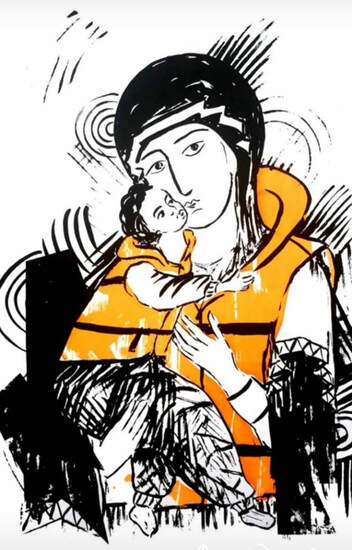 “We call upon the federal government, in collaboration with the national Aboriginal organizations, to revise the information kit for newcomers to Canada and its citizenship test to reflect a more inclusive history of the diverse Aboriginal peoples of Canada, including information about the Treaties and the history of residential schools.” Be silent for a moment and consider: How would you feel if the history of your people, which included incredibly hardship and resiliency, was misrepresented or entirely ignored in your nation’s history books? The above is the 93rd of 94 “Calls to Action” detailed in the Truth and Reconciliation Commission Report for Canada. The report examines the historic abuses suffered by Canada’s First Nations at the hands of settlers, governments, social agencies and Churches. It also details the resiliency of the First Nations peoples, and the ongoing legal implications of the Treaties that were signed between the Nations and Canada. The 94 calls to action include but are not limited to: formal apologies from the nation and Church denominations; child welfare; health; language and culture; spirituality; education; the justice system; missing children and burial information. What we see in this report is the devastating legacy of the forced displacement of Indigenous People in Canada, a policy and practice that began with first contact, went through the Residential School system, includes the “Sixties Scoop” of children from their families, and continues today in systemic and structural racism. The First Nations of North America have been internally displaced people for generations, a fact that is only now being officially recognised in some places. Canada has failed to honour its elders, failed to listen to and respect the people who were here first, the people who offered the deepest and costliest hospitality to the European settlers. The TRC’s 93rd call is for an honest and inclusive history of Canada to be taught to newcomers, including refugees. If we do not tell the truth about the past, there can be no hope for moving forward. Read: Luke 2:22-38; Revelation 7:9-12. Pray: Start reading through the 94 Calls to Action and pray for each one. This will take some time -days or weeks - but it is worth our time. Ask what role you have in seeing these calls acted upon, and if there is any change that is needed in your own heart. 94 Calls to Action : (As of November 2018, only 10 of the calls have been completed, 19 are in progress, 32 have projects proposed, and 33 have not been started.) 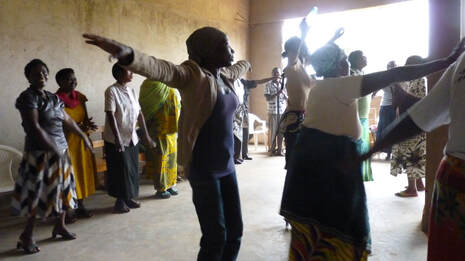 Worshiping with Forcibly Displaced Women in Nairobi Worshiping with Forcibly Displaced Women in Nairobi International Association for Refugees (IAFR) works with 160 Churches that live and minister in the Kakuma Refugee Camp in Kenya. Be silent for a moment and consider: What does a typical “Church” look like, in your experience? How might Church be different in a refugee camp? How might it be the same? It is both wonderful and humbling to find God in unexpected places. It is wonderful because God is working all over the world, and no walls, governments, social situations, economic conditions or wars can keep God out. It is humbling because of course God is there, and why would we think it was unexpected in the first place? That has a lot more to do with our expectations and cultural assumptions than it does with the power of the Gospel. Many Christian groups have the idea that they should plant Churches, and of course this can be a very good thing to do. But check first. Are there already Churches ministering and serving where you want to plant? Do they need you, or even want you to come in and start something new? Or is it better to partner and support the ministry that is already happening? The Nativity story includes many “unlikely” characters, not the least of which are the shepherds in Luke 2 and the Magi in Matthew 2. One group are local agrarian workers, the other are foreign intellectuals. They were both “unlikely” groups (in the world’s view) to be visited by a host of angels, or to be guided by a star, and to show up at the birth of the Messiah. Why would God choose them of all people as witnesses? Well, why should it surprise us that he does? Both groups attend the mother and baby at different times, and afterwards the shepherds announce the good news of the birth to anyone who would listen. They are the first evangelists. And the Magi presumably share what they have seen when they return home as well. Refugees come from every background, from hard-working farmers to well-educated intellectuals, and everything in between. Many of them are Jesus-followers who carry a missionary heart with them wherever they go. When IAFR went to Kakuma they wisely partnered with the Churches already worshiping, serving and living within the camp. The Churches they are working with represent only a portion of those that are ministering there. What’s more, these Churches are now planting new ministries outside of the camp, because the Gospel cannot be stopped. God is on the move, and it should not surprise us that he is working in and through the Kakuma Refugee camp. Read: Luke 2:8-20 Pray: Ask God to uncover your false expectations and assumptions about what he can or cannot do in the world, and to replace them with awe and wonder at his plan, his love, and his power. Thank God for the Churches being run by refugees all around the world, and the way the Gospel is advancing in the midst of the crisis of mass human displacement. These are the countries that are producing the most displaced people (Refugees, IDP, and Asylum Seekers): 1. Syria (13.5 million) 2. Colombia (8.2 million) 3. DR Congo (8.1 million) 4. Afghanistan (5.5 million) 5. Venezuela (4.5 million) 6. South Sudan (4.3 million) 7. Yemen (3.8 million) 8. Somalia (3.6 million) 9. Ethiopia (3.2 million) 10. Sudan (2.7 million) *Note that there are also 5.4m Palestinian refugees in the Middle East for which the UN reports separately. *Source Be silent for a moment and consider: How do you define family? Here is another list of countries that we in the West have been taught almost nothing about, except that we should fear them. The words that come to mind for many when they encounter this list are: chaos, poverty, terrorism, and enemy. Whole cultures, people groups, families and individuals are reduced to the sum of our ignorant fears. We define them as first and foremost separate from us, not a part of us. Once again, we should remember that people do not leave their homes and everything they know on a whim. The people who are fleeing their homes are doing so because there is a genuine and credible threat to their safety and their family’s safety, and they are looking for a place to be where they can be safe. But even more, we must remember that these are our brothers and sisters. Their past, present and future is inextricably bound up with ours. Luke reminds us of this in the second genealogy we come across in the Gospels. Where Matthew’s genealogy of Jesus begins with Abraham, Luke is a little more ambitious and takes us all the way back to Adam, and in fact to God. Jesus is shown here to be the Saviour of all humankind, and we are confronted with the fact that we all share a common heritage. Jesus incarnated, lived, taught, was persecuted, died, and was resurrected for all of humanity, not just certain parts of it. It makes no sense, therefore, to believe that the countries on the above list are not part of us, and that we are not part of them. They are our brothers and sisters. All of us are caught up in the same family line with Jesus. Do we dare come to God with the ancient question: “Am I my brother’s/sister’s keeper?” Read: Luke 3:23-38 Pray: Pray for your family. Start with your immediate family, then start moving outwards to your extended family and your Church family. Then start going further and further out. Ask God to help you see those who are fleeing violence and terror in the above countries as brothers and sisters as well. Ask God what it means, on a global scale, to be our brother’s and sister’s keeper. 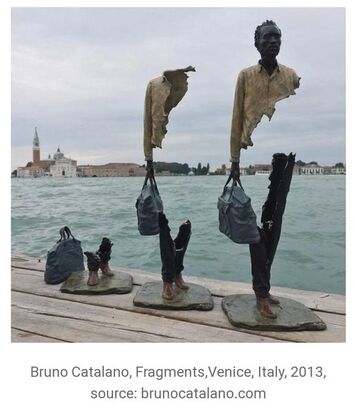 “68% of the world’s refugees come from just 5 countries: Syria (6.6m), Venezuela (3.7m), Afghanistan (2.7m), South Sudan (2.2m), and Myanmar (1.1m).” *Source Be silent and consider: What circumstances would make you flee from your home, your city, your country? There is a lot of fear around the refugee situation. Some of the fear is manufactured by authorities or media outlets, because it is useful to keep people afraid, and in particular afraid of the Other. People are more easily manipulated when they are afraid, and more susceptible to marketing. (This fear can be exacerbated by the tiny percentage of newcomers who commit crimes in their host countries.) There is also fear because we are generally cautious about that which we don’t know. New cultures and customs, languages, religions, etc…do not always mix seamlessly with the culture and norms with which we are familiar, and this can make us uncomfortable. When the Magi arrived in Jerusalem with, they thought they were bringing good news, but their presence and their purpose evoked wide-spread fear: “When King Herod heard this he was disturbed, and all Jerusalem with him.” Who were these strange foreigners? Why had they traveled so far to get here? Where were they going and what were they planning? Why were they talking about a new-born king of the Jews? Herod, his advisers, and apparently all Jerusalem with him did not see their arrival as good news, but bad news. Dangerous news. The kind of news that results in secret meetings and vicious schemes. The kind of news that authorities respond to with violence, threats and fears. Herod feared the Other and the change that they represented. The five countries cited above as the source of 68% of the world’s refugees are ones that, sadly, many of us in the West have been taught to fear. They have been characterised as “bad news” to us, and it is nearly impossible to shake that conviction from some people’s minds. But what if, in our trembling, we are in danger of missing out on God’s good news? What if we have been duped by those who would profit from our fear? What if we learned to see people from these countries not as a threat to our safety, but as beloved children of God who themselves are fleeing from a genuine threat to their safety? Read: Matthew 2:1-18 Pray: Get out your map once more and begin to pray for Syria, Afghanistan, Venezuela, South Sudan and Myanmar. Pray for God’s peace, justice and order in the situations that are causing so many people to flee. Pray for the people who are fleeing, that they would find refuge and welcome and long-term safety. And pray for your heart, and the hearts of people in your Church, your city, your country, that you would not be governed by fear but by wisdom and love. Finally, ask yourself if there are ethnic groups in your city that you have been conditioned to fear, and see if there are ways to connect with local community associations to help you meet people and overcome your fears. 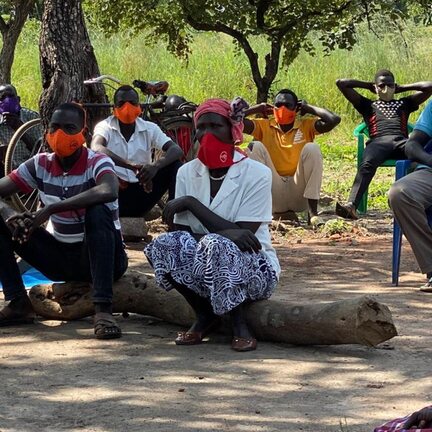 I Live Again Uganda, Palabek Settlement I Live Again Uganda, Palabek Settlement “A tiny fraction of the world’s refugee population was resettled in 2019 (less than 1%). 26 countries received a total of 107,800 refugees for resettlement. Leading countries of resettlement include Canada (30,100), the USA (27,500), Australia (18,200), the UK (5,600), France (5,600) and Sweden (5,200).” Source Be silent for a moment and consider: How much is 1 percent of your city? Imagine your city was in dire need, and only 1 percent could be helped. Resettlement is when a refugee is unable to return home but is welcomed to settle another country. As we can see above, this is not exactly a popular option among most countries. Talk of resettlement is often met with cries to “take care of our own first!” There is also a heavy dose of NIMBY in a lot of places: Not In My Back Yard. As a result, the number of refugees being resettled is minuscule compared to the refugee population. We like to keep our “blessings” to ourselves. Thankfully, this is not God’s attitude towards us. When the angels appeared to the shepherds, the good news they brought was intended to cause “great joy that will be for all the people.” This news was not exclusive to the shepherds, nor even just for Bethlehem or Judea. Jesus’ final message to his disciples was that they were to take the message of the good news to Jerusalem, Judea, Samaria, and the ends of the earth. (Acts 1:8) We tend to read the above as an impulse to evangelism and mission, but perhaps we should see it as instructive for how we share our blessings. Craig Greenfield says, “If your church romanticises the Hondurans they meet on short term mission trips, but demonizes the Hondurans seeking asylum in a refugee caravan, it might be time to re-examine what mission is really all about.” Start asking questions about how many refugees your country, and your area, are resettling, and why. Read: Luke 2:8-11 Pray: “Father in heaven, please be near those who are forcibly displaced today. Some know you. Others do not. You love them all. May they all know your presence, protection and provision. You have not forgotten them. You know their names. You know their stories. You know their journey. Please lead them. You are not far from them. You know their loss and suffering. You suffered too. Please heal and comfort them. You are not against them. You deeply care for each man, woman and child. Please renew their faith, their hope and their strength. They've lost their place in the world. Be their refuge. Graciously lead them to a safe place where they can settle and rebuild their lives. We pray for peace, justice and reconciliation in their countries of origin. We pray in the name of Jesus who was once himself a refugee in Egypt. Amen.” Opportunities 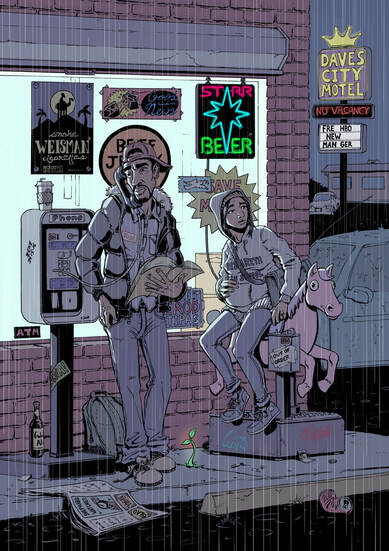 "JoseyMaria" Everett Patterson "JoseyMaria" Everett Patterson Who is hosting refugees? Turkey (3.6m), Colombia (1.8m), Pakistan (1.4m), Uganda (1.4m), Germany (1.1m), Sudan (1.1m), Iran (1m), Lebanon (916,000), Bangladesh (855,000) and Ethiopia (733,000). *Source Be silent for a moment and consider: What is your perception of the above countries? What is that perception based upon? What do you actually know about them? Much is made of the fact that there was “no room at the inn” for Mary and Joseph. In our Western mindset we sometimes imagine a crotchety landlord barring the doors of some low-rent motel and telling the expectant couple to get lost. But hospitality in the Middle East was, and still is, serious business. If Mary and Joseph were turned away from the inn, there really was no room at the inn. So, they were given another space to rest and to deliver their baby, because they would not be left without hospitality of any kind. Hospitality in the West has often become a formal, professionalised thing. It puts us in mind of dinner parties or Air BnB’s. Hospitality to the poor has been almost entirely delegated to social agencies and government-funded shelters. Our homes are normally seen, even within the Church, as private places, safe and sacred spaces for us and only a few selected other people with whom we are comfortable. Thank God that is not hospitality the world over. This is not to say that refugees are all being housed in people’s homes throughout Turkey, Pakistan, Uganda, etc…There are far too many people for that, in part because other nations have closed their borders. When a country refuses to receive refugees it does not make the problem of offering hospitality go away, it just transfers the responsibility to another country. As we can see in the list above, for the most part that responsibility has been transferred to some of the poorest nations in the world. We can, and must, do a better job of making room in the inn. Read: Luke 2:4-12 Pray: Get out the map again, then find and pray for each of these nations in turn: Turkey, Colombia, Pakistan, Uganda, Germany, Sudan, Iran, Lebanon, Bangladesh and Ethiopia. Pray for IAFR Canada's partner, Beirut Nazarene Church, as they respond to the needs of forcibly displaced people in their region. Thank God for how they have hosted refugees, and pray for wisdom, provision, and peace in their land. Then pray that other nations would step up to receive the blessing of hosting as well. 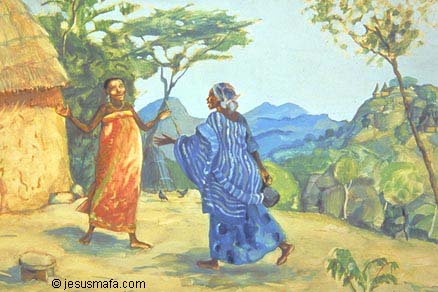 "The visitation" "The visitation" “85% of the world’s refugees are hosted by developing nations. 27% are hosted in Europe (including Turkey). 26% are hosted in sub-Saharan Africa. 17% are hosted in Asia/Pacific. 11% are hosted in the Middle East and North Africa. 18% are hosted in the Americas.” *Source Be silent for a moment and consider: How much is 18 percent? Is God satisfied with 18 percent of our attention, devotion, and obedience? There is another very unlikely character in the Nativity story. Almost the first things we learn about Elisabeth, wife of Zechariah the priest, is that she is childless, barren and old. Surely this threatened to be her primary identity, self-imposed but also in the eyes of others. Yet this is not all that she is. Luke highlights that she descends from Aaron, thus carrying a “priestly” inheritance just as her husband. We also learn that she, like Zechariah, is righteous in the eyes of the Lord, “observing all the Lord’s commands and decrees blamelessly.” She is not just an empty vessel to God, but is filled with goodness already. Yet for all this she is still a surprising option to carry a divinely-appointed child, at least in the perspective of the world. Too old, too barren, not a viable candidate for pregnancy. But the joy she had thought denied to her now descends upon her in a miraculous way. The meeting of Mary and Elisabeth, both carrying children of promise in their wombs, is more than just an occasion for Elisabeth’s baby to start moving around a little more. Here are two of the seemingly least likely actors in the central story of humanity, greeting each other in an unmarked home in the hill country of Judea, far from any centre of political power, wealth or influence. How many significant meetings, between divinely-significant people, are happening in refugee camps, along the refugee highway, in host countries in sub-Saharan Africa, forgotten European ports, in Asia/Pacific or the Middle East and North Africa? Let us not be so enamoured with our sense of centrality and importance that we overlook God’s beloved people around the world, or miss out on what he is doing. Read: Luke 1:5-25, 39-45 Pray: Get out a map and pray over the regions mentioned above. Pray for 10 minutes, rationing your time according to the hosting percentages.
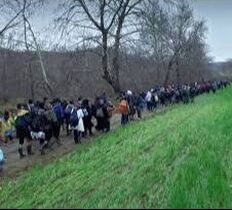 Human Flow Movie humanflow.com Human Flow Movie humanflow.com 85% of the world’s refugees are hosted by developing countries. * Source Be silent for a moment and consider: Do we in the developing world have a sense that our wealth, political systems, and technology are the answer to the world’s problems? Might that sense be…wrong? Might we need to repent for both our arrogance and our close-fisted and hard-hearted approach to those in distress? We will get into the actual numbers and countries involved in hosting refugees in the days to come, but for now let us be confronted by this well-supported fact: 85% of the world’s refugees are being hosted by developing countries. Not by wealthy Western countries. In a way, this should not surprise us. All throughout Scripture, and indeed history, God seems to use “unlikely” people and nations to bless the world. When the Angel Gabriel arrived to announce that the Messiah would be born into the world (surprising enough in itself), the choice of Mary to host the child in her womb was, from a worldly perspective, unlikely. She was socially, economically, politically, technologically, and ethnically vulnerable. Presumably she knew all her disadvantages, all the reasons she should protest and say no. She does in fact as the obvious question of the Angel, but once assured that what we think is impossible is possible for God, she quickly joins her will to God’s: “I am the Lord’s servant,” Mary answered. “May your word to me be fulfilled.” (Luke 1:38) Mary’s “yes” changes the world. She is the very first person to “accept Jesus into her life”, in a very literal way, becoming for us a model for us. Her hospitality to the king of creation creates a way through which redemption and salvation personified enters the mud and blood of human existence. An unheralded, unknown, unlikely young woman opens herself up to be a host, and the entire world is blessed. What if more people said yes? What if we considered the blessing before the cost? What if God wants to bless the world, not through all our wealth, but through our willingness? Read: Luke 1:26-38 Pray: Lord, make us willing. Bless those who have been willing, even at great cost, to host the world’s sojourners. Lord, if our wealth stands in the way of our willingness, please remove it from our hands so that we would be ready to receive. |
WELCOME!
Our vision is to help people survive and recover from forced displacement. We do this together with the church, both globally, and locally in Canada. Archives
May 2024
Categories |
ABOUT IAFR.CA |
OPPORTUNITIES |
AFFILIATES
|
CONTACTIAFR Canada
374 Sheppard Ave E Toronto, ON M2N 3B6 [email protected] Please Note: IAFR Canada does not sponsor people to resettle in Canada. You may want to contact one of Canada's sponsorship agreement holders. |
|
*IAFR Canada is a distinct organization from IAFR USA
All photos on this website are by IAFR unless otherwise noted |
© 2020 International Association For Refugees Canada

 RSS Feed
RSS Feed